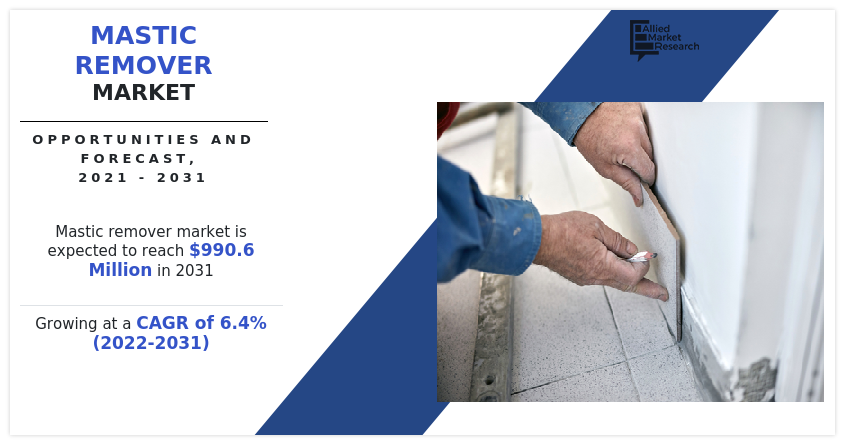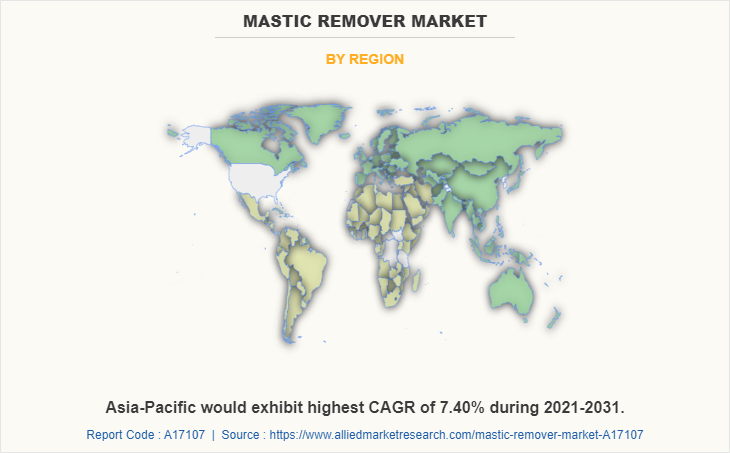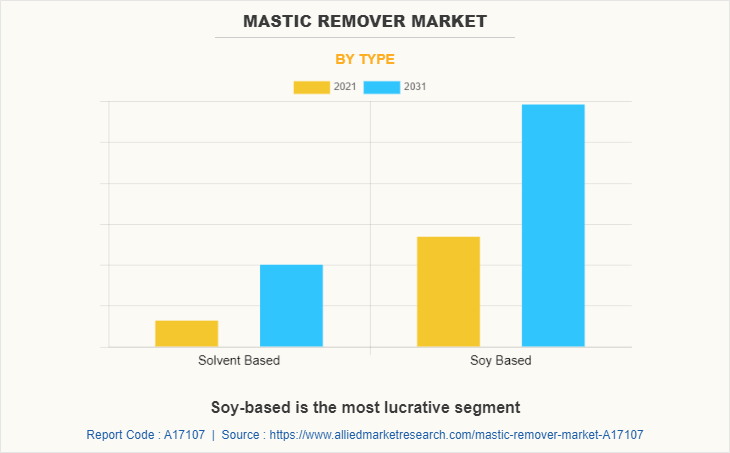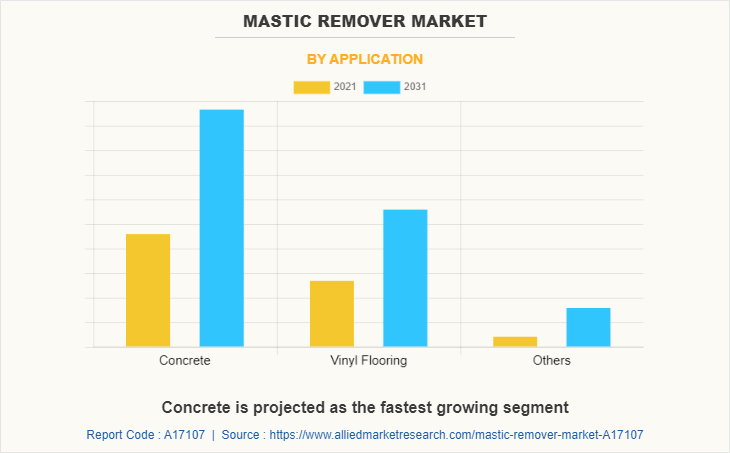Mastic Remover Market Research, 2031
The global mastic remover market was valued at $531.6 million in 2021, and is projected to reach $990.6 million by 2031, growing at a CAGR of 6.4% from 2022 to 2031.
Mastic removers are specially formulated compounds used for removing asbestos/black mastic, vinyl glue, ceramic mastic, and traditional carpet adhesive from concrete and vinyl floorings. It safely removes most mastics and adhesives in a single application. The chemical agent present in mastic remover allows it to penetrate through the various layers of mastics and adhesives on a surface so that it is absorbed into the bottom layers ensuring effective removal and a cleaner surface.

Increase in investments in building infrastructure in countries such as the U.S., China, Japan, Mexico, and India have led the building & construction sector to witness a significant growth, where mastic removers are widely used to remove rubber type mastics, floor tile adhesives, as well as tar, paint and motor oil stains from masonry and concrete surfaces.. This may act as one of the key drivers for the mastic remover market. In addition, factors such as increase in demand for various consumer goods, increase in investment, policy support, and competitive advantage has surged the establishment of manufacturing industries in both developed and developing economies where mastic removers are used to remove sheet vinyl mastics, tile mastics, carpet mastics, and asbestos mastics in different industrial facilities. This is expected to propel the growth of the mastic remover market during the forecast period.
However, volatility in prices of raw materials used for producing mastic removers restrains the manufacturers with less investment potential to enter into mastic remover market. This factor is expected to hamper the growth of the mastic remover market during the forecast period.
On the contrary, mastic removers are safe, effective, and environmental-friendly formulations widely used for removing all latex and acrylic carpet adhesives in various end-use sectors including building & construction, hospitals, schools, industries, and others. Increase in awareness about environment-friendly activities has surged the demand for various sustainable products in both developed and developing economies. Furthermore, increase in government regulations and stringent policies have led several end-use sectors to become linear toward using environmental-friendly products. This is anticipated to increase the sales of mastic removers; thus creating lucrative opportunities for the market.
The mastic remover market is segmented into type and application and region. On the basis of type, the market is categorized into solvent-based and soy-based. On the basis of application, it is divided into concrete, vinyl flooring, and others. Region-wise, the market is studied across North America, Europe, Asia-Pacific, and LAMEA.
The major companies profiled in this report include Abatement Technologies, Abatix Corp, American Building Restoration Products, Inc., Aramsco, ArmorPoxy, Citrus Depot, Franmar, ILC Dover LP, Jon-Don, LLC, Mast Away Mastic Remover, Norkan Inc., Quest Safety Products, Inc., Soy Technologies, LLC, SureCrete Design Products, and Twin Chemicals, Inc.

The Asia-Pacific mastic remover market size is projected to grow at the highest CAGR of 7.4% during the forecast period and accounted for 36.4% of mastic remover market share in 2021. This is attributed to proliferating demand for mastic remover from various end-use sectors such as building & construction, industrial manufacturing, and others, which in turn have led the mastic remover manufacturers to increase their production capacities. Furthermore, China's industrial manufacturing sector is increasing rapidly, which in turn has enhanced the performance of the mastic remover market in the region. According to a report published by the United Nations Statistics Division, China witnessed around 28.7% of the global manufacturing output for various consumer goods in 2019. Also, countries such as India and Australia, are witnessing a rapid increase in building & construction sectors where mastic removers are employed to remove stubborn coatings from concrete such as coating, carpet or tile adhesive, thin-set and thin mil coatings such as urethane or paint. For instance, according to a report published by India Brands Equity Foundation in March 2022, India is expected to become the third largest construction market in the world by 2022.

By type, the soy-based segment dominated the global market in 2021, and is anticipated to grow at a CAGR of 6.5% during the forecast period. This is attributed to the fact that soy-based mastic removers are biodegradable formulations used to remove black asphalt-based mastics, yellow carpet adhesives, grease, lubricants, inks and other petroleum-based residues. They are ideal for projects where a biodegradable formulation with no odor product is preferred. Moreover, an increase in awareness of environment-friendly activities has led the customers to become linear toward using sustainable products. This factor has increased the popularity of soy-based mastic removers among various end-use sectors.

The concrete segment was the largest revenue generator in 2021 and is anticipated to grow at a CAGR of 6.7% during the forecast period. Growth in population led the building & construction sector to witness a significant growth where mastic remover is widely used to remove black asphalt based mastics, yellow carpet adhesives, grease, lubricants, inks and other construction adhesives. For instance, according to a report published by the U.S. Census Bureau, the total construction spending during February 2022 was estimated at a seasonally adjusted annual rate of $1,704.4 billion, which was 11.2% above the February 2021 estimate of $1,533.3 billion. This factor is escalating the growth of concrete segment in the global market.
IMPACT OF COVID-19 ON THE GLOBAL MASTIC REMOVER MARKET
- The novel coronavirus is an incomparable global pandemic that has spread to over 180 countries and caused huge losses of lives and the economy around the globe.
- The mastic remover market has been negatively impacted due to wake of the COVID-19 pandemic, owing to its dependence on the building & construction, industrial manufacturing, and other end-use sectors. The increasing risk of infection among the workforce has resulted in delayed construction projects amid the COVID-19 scenario. For instance, according to an article published by CNA, the construction Industry Joint Committee (CIJC) has said that the shortage of manpower may lead to delay in construction projects attributed to workplace safety, and other factors.
- Moreover, several sustainable product manufacturers in Southeast Asia and Australia have either shut down or decreased their operations, which in turn have resulted in supply chain disruptions amid the COVID-19 period.
- Furthermore, different raw materials for producing mastic removers are purchased or hired from other enterprises. The decreased purchasing potential of suppliers has also negatively impacted the market amid the COVID-19 scenario.
- In addition, the COVID-19 pandemic has led to disruptions in transportation, contractual implications problems, labor shortage, and other factors that together have led the construction sector to witness a downfall. For instance, according to a report published by the Australian Performance of Construction Index (PCI) Survey, the construction activity has dropped by 16.3 points to 21.6 points from March 20201 to August 2020.
- In 2020, mastic remover prices were higher in Asia-Pacific region. The price rise was due to continued regional demand trends and tight product availability. Firm downstream mastic remover demand and stronger upstream costs are expected to sustain the price gain
- However, emerging geographic scenarios, enhanced domestic supply chain, and strong public investments are projected to drive the growth of mastic removers used in vinyl flooring applications. For instance, according to an interim report for the 2021 Australian infrastructure plan, the Australian Construction Industry Forum (ACIF) expects the construction industry to return to pre-COVID-19 levels by 2022-23, driven by strong public investments. This is predicted to boost the growth of the mastic remover market post-COVID-19 period.
Key Benefits For Stakeholders
- This report provides a quantitative analysis of the market segments, current trends, estimations, and dynamics of the mastic remover market analysis from 2021 to 2031 to identify the prevailing mastic remover market opportunities.
- The market research is offered along with information related to key drivers, restraints, and opportunities.
- Porter's five forces analysis highlights the potency of buyers and suppliers to enable stakeholders make profit-oriented business decisions and strengthen their supplier-buyer network.
- In-depth analysis of the mastic remover market segmentation assists to determine the prevailing market opportunities.
- Major countries in each region are mapped according to their revenue contribution to the global market.
- Market player positioning facilitates benchmarking and provides a clear understanding of the present position of the market players.
- The report includes the analysis of the regional as well as global mastic remover market trends, key players, market segments, application areas, and market growth strategies.
Mastic Remover Market Report Highlights
| Aspects | Details |
| By Type |
|
| By Application |
|
| By Region |
|
| Key Market Players | American Building Restoration Products, Inc, Abatix Corp, SureCrete Design Products, Jon-Don, LLC, Aramsco, Quest Safety Products, Inc., ILC Dover LP, Mast Away Mastic Remover, Franmar, Twin Chemicals, Inc, Citrus Depot, Soy Technologies, LLC, Abatement Technologies, Norkan Inc, ArmorPoxy |
Analyst Review
According to CXOs of leading companies, the global mastic remover market is expected to exhibit high growth potential during the forecast period. Mastic removers are used in hospitals, schools, residential facilities, and industries for removing stubborn coatings from concrete such as coating, carpet or tile adhesive, thin-set and thin film coatings such as urethane or paint. Vinyl flooring that requires safe, efficient, and odorless mastic, later, acrylic or grease removal activities can be accomplished with the use of mastic removers.
In addition, mastic remover possesses excellent adhesive qualities that make it best suited for removing asbestos containing glues. Soy-based mastic remover serves as a biodegradable formulation used to remove black asphalt based mastics, yellow carpet adhesives, grease, lubricants, inks and other petroleum based residues. Furthermore, factors such as rise in awareness about environment-friendly activities has surged the popularity of biodegradable mastic removers in various end-use sectors. CXOs further added that sustained economic growth and development of the building & construction sector have increased the popularity of mastic remover.
The concrete segment was the largest revenue generator in 2021 and is anticipated to grow at a CAGR of 6.7% during the forecast period.
Nowadays, companies operating in the mastic remover market are focusing more on the development of safe, effective, and environmental-friendly formulations.
The Asia-Pacific mastic remover market size is projected to grow at the highest CAGR of 7.4% during the forecast period and accounted for 36.4% of mastic remover market share in 2021.
The global mastic remover market is projected to reach $990.6 million by 2031, growing at a CAGR of 6.4% from 2022 to 2031.
The major companies profiled in this report include Abatement Technologies, Abatix Corp, American Building Restoration Products, Inc., Aramsco, ArmorPoxy, Citrus Depot, Franmar, ILC Dover LP, Jon-Don, LLC, Mast Away Mastic Remover, Norkan Inc., Quest Safety Products, Inc., Soy Technologies, LLC, SureCrete Design Products, and Twin Chemicals, Inc.
Loading Table Of Content...



